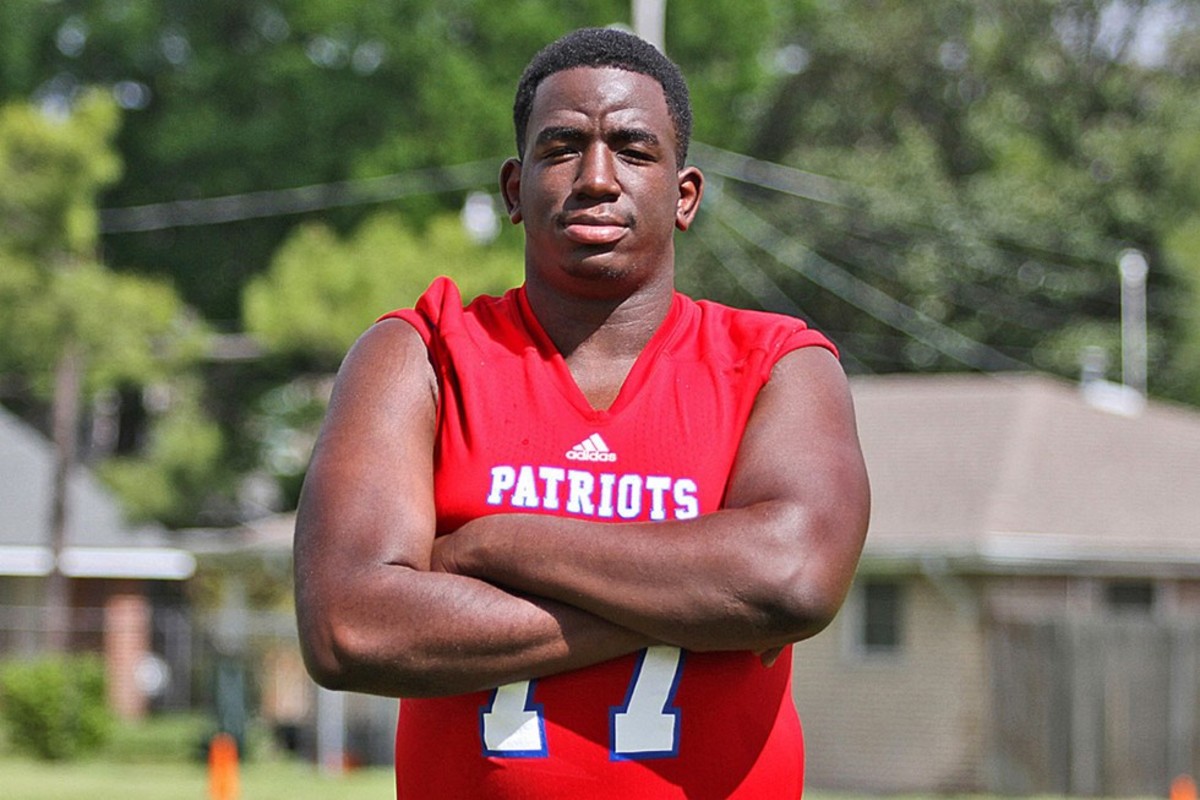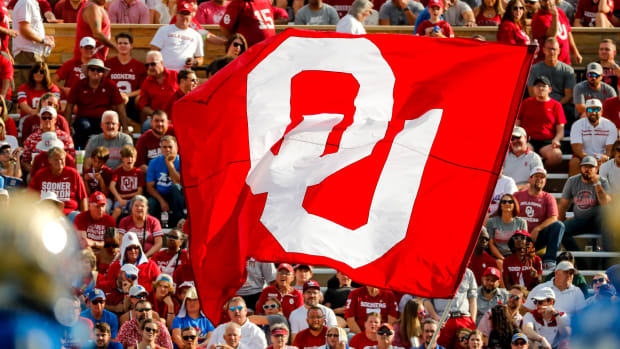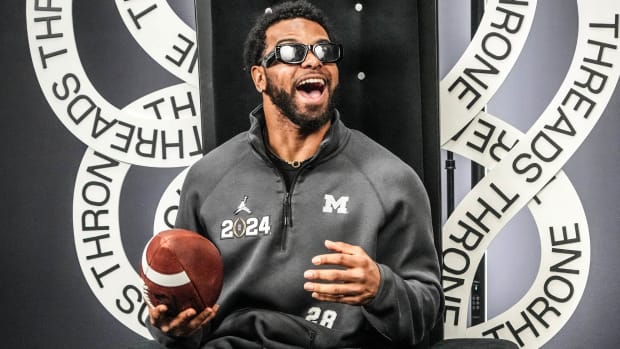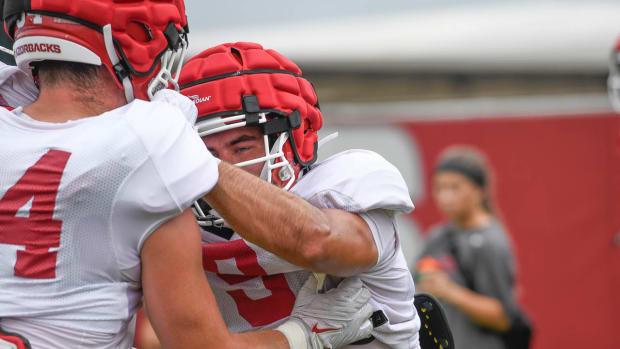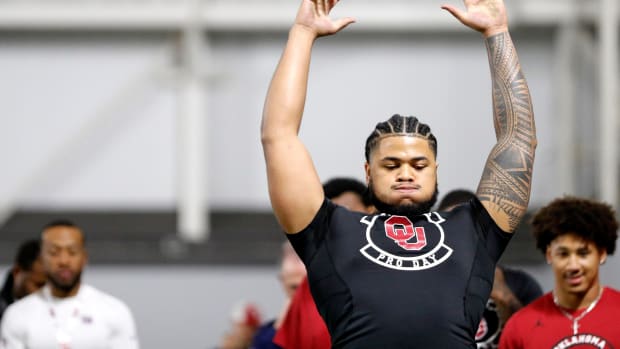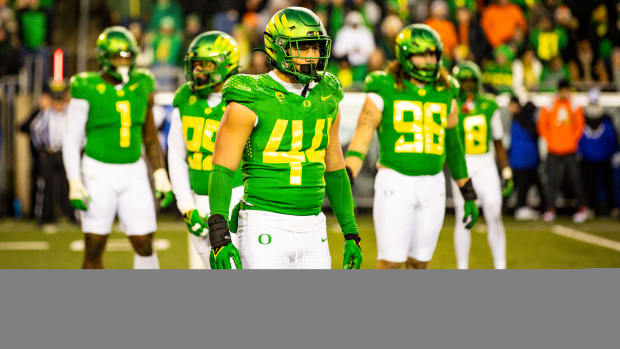Turning points: The story of Willie Allen, the coach who took him in and his choice to stay home and play for LSU
RIVER RIDGE, La. — Willie Allen plants himself in the middle of the motorboat, his eight-foot wingspan extended in full. He holds tight to either side of the watercraft, knuckles clenched. The 6' 7", 300-pound high school senior and his family are piloting through the swampy waters of Manchac, La., a speed bump of a town sandwiched between massive Lake Pontchartrain and the smaller Lake Maurepas, northwest of New Orleans. They come here nearly every summer weekend, and they take the boat out, and it's getting easier for Allen. But it still isn't easy.
Allen hates water. He has for a decade, ever since his family—his other family—ignored evacuation instructions in August 2005 and remained in its home in New Orleans's Calliope Projects. Hurricane Katrina was about to flush waves of water (some from the same lake upon which Allen now floats) into the city, and by the time the 8-year-old, his mother, siblings and grandparents set out for the Superdome, eight feet of flooding stood in their path. Allen was a weak swimmer, but his older brother, Floyd, helped steer him through the debris and dead bodies.
Allen hated New Orleans. On that August day, the flooding claimed all he owned but the clothes on his back. The hurricane forced a second-grader to contend with more sorrow than most people handle in a lifetime. It forced him to watch suicides in the Superdome, to wonder if he would find Floyd after the 16-year-old was separated from family on buses to Houston. It abandoned him to a green cot in the Astrodome for weeks, made him hate Chick-fil-A since he associates boxes of the sandwiches with those days of homelessness.
Weeks after the storm, Allen's family resettled in Lafayette, a town of 200,000 in southwestern Louisiana that had come through Katrina with manageable damage and hosted thousands of displaced New Orleanians. Allen liked it there. He made friends. He went shopping with donated gift cards his oldest sister, Auriel, had brought from New Orleans. He felt safer than he had in the projects where he grew up.
The day, a year later, when Allen's mother told him the family was returning to New Orleans, he cried. He thought he had escaped for good. He wanted to be anywhere but stuck between that lake and that river. Now, though, a decade later, grown from a worried kid into one of the premier offensive linemen in the 2016 recruiting class, Allen is staying. He committed to play football at LSU on Jan. 21, picking the program an hour down the road over offers from Miami, Auburn and TCU, among more than 30 others. He could have escaped, could have turned on the place that once turned on him. But apart from that boat, Allen is fearless. There is nothing to run from anymore.
*****
[video: 13724998]
Once they were back in New Orleans, living Uptown in a tough neighborhood just west of the Irish Channel, Allen's family members began to recognize his vast athletic potential. At the time, however, the 11-year-old, by then standing 5' 9", wanted to play basketball. He hadn't touched a football since Katrina. A family friend, Lester Zeigler, took interest, and he realized the most direct path to college ball for the learning-disabled preteenwould be through a private school that could help improve his test scores in addition to providing competitive sports. Zeigler suggested Isidore Newman School, which counts Peyton Manning and Odell Beckham Jr. among its graduates and was a two-mile commute from Allen's home.
But Allen failed Newman's admissions test twice. Zeigler kept looking, and the two set their sights on John Curtis Christian School, which one of Allen's childhood friends, Devon Benn, attended. Allen gained admittance and entry into the school's work-study program, which paid for tuition, but there was a catch: Its campus in River Ridge, La., was a 30-minute car ride west.
Zeigler agreed to drive Allen, which he did for his eighth- and most of his ninth-grade year—until Zeigler's business fell on hard times. Forced to improvise, Allen began to set his alarm for 5 a.m. He would wake up and walk the mile from his home to the streetcar in the dark, through a neighborhood not necessarily safe even in broad daylight. (The New Orleans Police Department's crime map reveals three assaults, six vehicle break-ins, two counts of disturbing the peace, two illegal weapons charges, six thefts, two auto thefts and a homicide within a six-block radius of Allen's path in January 2016 alone.) From there, he'd ride the streetcar west down St. Charles Ave. and north up Carrolton Ave. He would get off at the end of the line, and he'd wait. Sometimes it took an hour for the Kenner Express bus to arrive—New Orleans's public works have a loose concept of time—and from there it was another 20 minutes down Jefferson Highway to Curtis's doors.
The summer after ninth grade, Allen was chronically late for workouts. By then, he had chosen football over hoops and had garnered the attention of Curtis offensive line coach Jerry Godfrey. The coach saw a 6' 6" freshman primed to fill out, and that potential rendered his ire all the greater when the quiet kid arrived late. Eventually, Godfrey pieced together the situation. Soon, he offered to drive Allen back east every evening, eliminating the bus portion of his journey. Then he learned his player was living with three siblings and his mom in a tiny, one-bathroom apartment. Godfrey, whose family hosted a Curtis player, linebacker Kenny Cain, from 2005-09, had an idea: Allen should move in.
Allen's mother, Robin, approved at once, and the rising sophomore arrived at the Godfrey home before fall camp with a duffel bag. Jerry's wife, Lindsi, was under the impression he would stay for a few days, but after she saw the size of his luggage, she knew better. When Allen moved into 9-year-old Bryce Godfrey's bottom bunk, he was there to stay. "It was family," Allen says. "I felt really comfortable. I was like, this is a turning point in my life."
*****
Courtesy of the Godfrey Family
The sixth of Robin Allen's nine children is no stranger to turning points, and two tragedies defined his childhood: the death of his father, Willie Earl Wheeler, from a heart attack in April 2003, and Hurricane Katrina two years later. Allen remembers flashes of Wheeler—playing with his keys, his towering 6' 8" frame—and has spent the years since his death trying to live up to the legacy of a man known for his hard work in the construction industry.
Robin worked off and on as a cook at various New Orleans hotels when her children were young, leaving her eldest, Auriel and Angelica, now 30 and 28, respectively, to raise their brother. The two did everything they could for Allen, styling hair on the side for pocket change they could give to the sweet boy. Despite the crime-ridden environment in which they grew up—family and friends faced legal issues and were known for heavy drinking—all eight siblings (one sister, who is younger than Allen, was put up for adoption as a child) managed to stay out of trouble. "We basically had a life example," Auriel says. "We saw firsthand if we chose the wrong path, what we would run into."
Throughout Allen's childhood, he saw friends jailed and killed for selling and using drugs. The elder siblings didn't need to say much to impress upon him the path he should take, and the closest he came to diverging from it was during a few days in elementary school, when Auriel learned he'd been acting out. "I stayed on him for a week," she recalls, laughing, "and after that week, we never had any problems."
Allen's emotional intelligence—he says he can read a stranger within seconds—is the result of a childhood spent observing and reacting. When his sisters missed his games because of work, he noticed, and he knew he had to pull his weight. When they continued to offer him money, he declined. He would mow lawns to acquire spare change, he told them. Years later, that accountability eased his transition into the Godfreys' home, into a family with parents who needed to know where he was at all times, who his friends were and if he had finished his chores. "It really wasn't hard, because I have a lot of respect for Jerry and Lindsi," Allen says. "It wasn't a big transition."
Hearing the family tell it now, the process was seamless. Brynn, now 7, immediately bonded with Allen, and Bryce, 11, knew the player from his dad's practices. When Allen moved in, Lindsi let him come to her, and he did, initiating conversation and thanking her for allowing him to stay. Their connection came quickly, and now, Jerry says, he'll come home to find Allen and his wife deep in conversation about life beyond football.
"A lot of people just can't grasp the dynamic of how our family works," Jerry says. "So many people have tried to make it a story that doesn't exist, tried to say what heroes we are, which is not accurate. We didn't find him at the boys home starving and accused of armed robbery. He was a good kid to start off with."
From the start, Allen knew he had to buy into Jerry and Lindsi's parenting style and that the same rules would apply to him as to Bryce and Brynn. Last Mardi Gras, he asked the Godfreys if he might be able to watch the parades from a spot with some of his Uptown friends. They didn't like the location, didn't like that people might have camera phones and recognize Allen, so they said no. He asked again this year. Same answer. He understands. His friends, the few he keeps in touch with from the old neighborhood, can come to the Godfreys' spot, down the parade route.
"I think it was really important to Jerry that it wasn't just a coach and a football player," Curtis's longtime head coach, J.T. Curtis, says. "It goes much deeper than that with Jerry."
Allen wouldn't be able to opt out of obligatory family outings, just as he'd be included in annual vacations to Gulf Shores, Ala., and trips to the camp in Manchac. Everywhere the Godfreys went, he would go, too, and their friends would be his. The second part, Jerry initially thought, might prove tricky. Louisiana is not the nation's most progressive state, and the coach knew some acquaintances might not be used to mixing with people of other races. "The good thing about Willie [is] his demeanor and his attitude and his character [have] changed people," Jerry says. "People who I never thought would ever [change]. But my mindset is, if you're friends of mine, you've got to accept everything that's part of us."
Now, when Willie's schedule interferes with a get-together, friends are dismayed, but they'll have to get used to that. Allen, who Scout.com rates as a four-star recruit and the No. 15 offensive tackle in the country, will leave for Baton Rouge this summer, where he'll join what could be the nation's most heralded class come National Signing Day. He chose LSU after months of talks with Jerry and Lindsi, including what he called a "mental breakdown" conversation on Jan. 14, the same day one of his favorite recruiters, Frank Wilson, left his role as a Tigers assistant to take the head job at the University of Texas-San Antonio. By the end of the recruiting process, Allen had become disillusioned, baffled that strangers would approach him—and Bryce, and his 14-year-old brother William—to say what school he should pick, annoyed by the lack of sincerity.
"Recruiters are like car salesmen," he says. "They tell you what you want to hear, and then once you buy the car, if it's not what you want, you've got to live with it."
As Jerry and Lindsi tried to get to the crux of what Allen wanted, the 18-year-old shared what irked him the most. "When this is over, when I pick my school, most of these guys I'll never hear from again," he told them. Both knew he was right—and hated to admit it.
"He wants somebody that is going to be there for him," Jerry says. His wife cuts him off: "He doesn't want to be forgotten."
*****
Courtesy of the Godfrey Family
Allen has been on the couch for an hour, a bowl in the crook of his arm, spoon in hand. It's a summer weekend at the Godfreys' camp, and the tackle and his friends are hungry. An avid baker, Allen is known for his tres leches cake, which he makes from scratch, but he has run into a problem: There is no blender, not even a whisk, at the house. He wouldn't dare commit the sin of store-bought icing, though, so he improvises, beating away with a spoon until his topping is fluffed to perfection.
With Allen, assume nothing. The kid who spent his childhood in an urban housing project loves country music, and his prized possession is a pair of $130, size 18 cowboy boots Lindsi purchased online. He wears them only for special events, like last spring's Bayou Country Superfest at Tiger Stadium, where he saw some of his favorite acts, including Blake Shelton and Miranda Lambert—a couple whose divorce incited a fit of emotions in the stoic teenager. ("That was the dumbest mistake ever," he says. "I would marry her [Lambert] right now. … She's on the market. But I don't have a chance.") In fact, Allen's musical tastes are so well known they inspired his nickname: "Big Black Country." His old friends from Uptown mock it, but Allen doesn't care. "I just enjoy life," he says. "You have to try new things."
His curiosity is staggering. The giant with the permanently furrowed brow wants to take drama courses at LSU, to attend culinary school someday. At John Curtis, he developed a passion for his philosophy class, where he was struck by a movie, God's Not Dead. It tells the story of a religious student and a professor who stopped believing in a higher power after his mother passed away. Allen related to that brand of questioning, as would many children of his generation in New Orleans. At 18, he is at the end of an era of those old enough to remember Katrina but young enough to have grown up in its wake, and the inherent loss and listlessness of that time made him the person he is today.
He clings to what he has earned, to the life he has been lucky enough to build, and he is quietly loyal. At school, Allen is everyone's friend, the gentle giant who can pull a teammate out of class without so much as a reprimand from the teacher—just because he's Willie.
"I'd like to take credit for [who he is]," J.T. Curtis says. "I know Jerry would like to take credit for it. But if I had that magic pill, I'd be like Donald Trump. I'd have 10 billion dollars."
*****
Courtesy of the Godfrey Family
At the Under Armour All-America Game in Orlando on Jan. 2, Allen had a larger cheering section than nearly every other prospect, even those from Florida. His traveling party included roughly 70 people: his biological family, who rented a 15-passenger van and drove from New Orleans; the Godfreys and their extended family, who all made the trip; and a large group of his pastor's former parishioners who live in Florida. At the showcase, Allen stood out, not only for his size and wingspan, but also for his speed and pass blocking, a skill that was rarely on display in Curtis's run-heavy offense. (The school is something of a football factory. It lost in the 2015 state semifinals but has won a title in 25 of the past 30 seasons.) Even so, the tackle remains raw, a player with huge upside who could thrive paving the way for star LSU tailback and Heisman Trophy candidate Leonard Fournette.
Still, when Allen talks about the Under Armour experience, it isn't about the positive feedback he received. It's about the people, the fact so many came to the game and would drop everything for him at a moment's notice. "It feels good to have more than one family, just for different life lessons," Allen says. "You're always with somebody, always have someone to talk to. This experience has changed my life completely."
As Allen thinks of his future, he can't escape his past. The Godfreys have impressed upon him the long odds of making it to the NFL—according to the NCAA, 6.5% of high school players make it to college, and 1.5% of those turn pro—and he knows he has to graduate from LSU with a degree other than general studies. With that in mind, he has decided he wants to go into business, and when football is done he'll use that degree to two ends. He wants to help Auriel franchise her bakery, and he wants to open a pair of rec centers, one in New Orleans and one in River Ridge. They will be loosely modeled after the one he attended, at a Boys & Girls Club near the Calliope Projects, and he wants to furnish daycare, tutoring and activities for kids who need them, kids like he once was.
These are big plans for an 18-year-old, but Allen doesn't see a reason in the world why he can't make them come true. His childhood, which could have been a liability, is now his greatest blessing. "It made me have no fear," he says. The world, he has learned, is like that boat. It rocks and it roils, but if your arms are long enough to hold on tight, you make it to shore every time.
